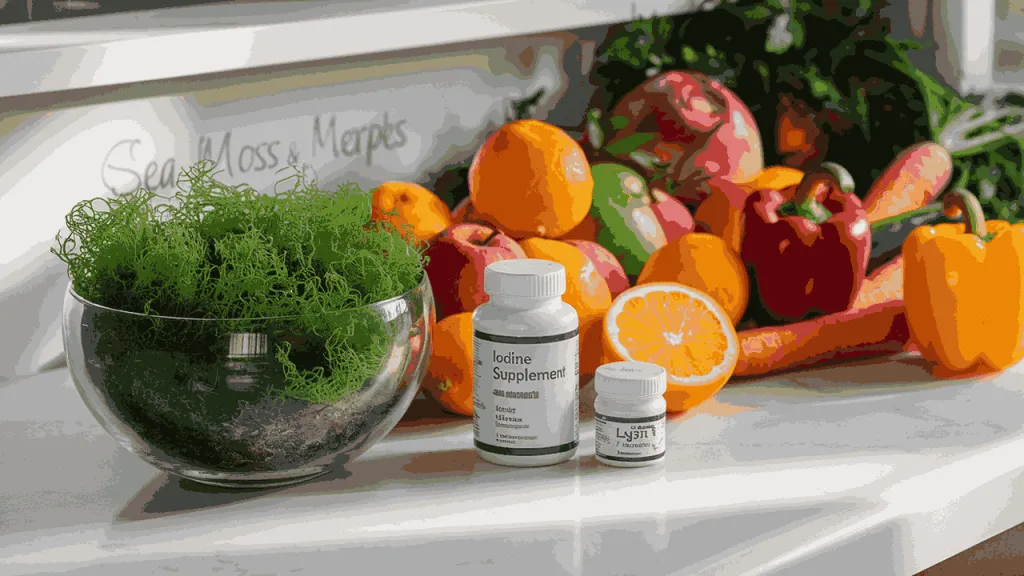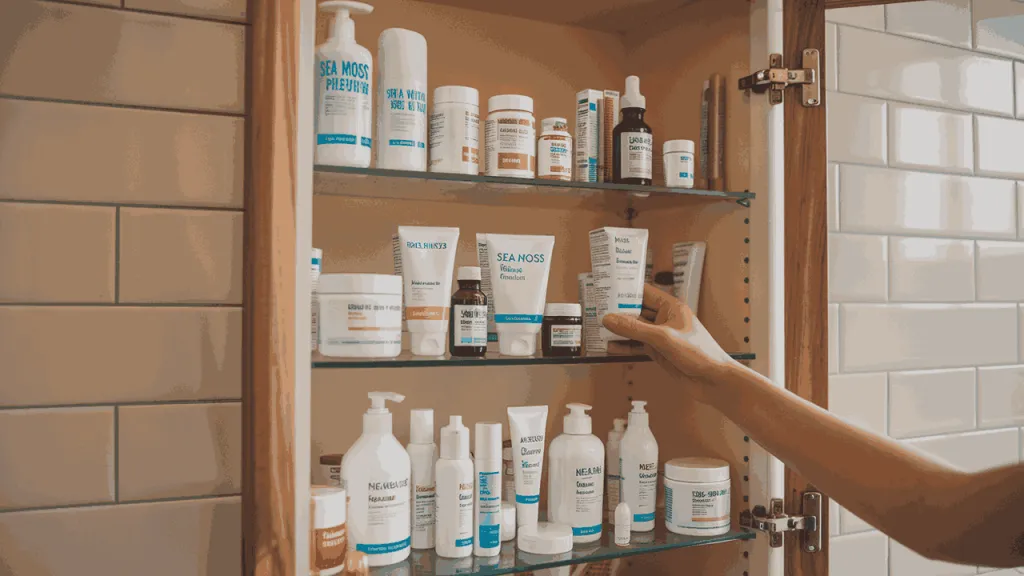As an Amazon Associate I earn from qualifying purchases.
Dealing with herpes outbreaks can be really challenging, and it’s natural to explore whether a natural remedy might offer some relief. Recently sea moss, a nutrient-packed seaweed, has been getting a lot of attention for its possible antiviral benefits, including its potential role in managing herpes viral infection.
Although the research is still in the early stages, it’s worthwhile to examine what sea moss is, how it might help, and how it could complement other strategies for managing outbreaks. As always, it’s important to consult with your healthcare provider before trying any new treatment.

Understanding Sea Moss and Its Nutritional Profile
A. Composition and rich nutrient content
You’ll find sea moss to be a nutritional powerhouse. It’s packed with essential vitamins (A, B, C, D, E, K) and minerals (calcium, iron, magnesium, potassium). Sea moss also contains omega-3 fatty acids and amino acids, making it a complete protein source.
B. Key minerals and their health benefits
| Mineral | Health Benefit |
| Potassium | Supports blood pressure |
| Manganese | Aids energy metabolism |
| Zinc | Bolsters immune defenses function |
| Iodine | Crucial for thyroid health |
C. Potential effects on gut and skin health
You may experience improved gut health as sea moss acts as a prebiotic, promoting beneficial bacteria. For your skin, sea moss contains citrulline-arginine and carrageenan, which may protect against damage and aid in wound healing.
With this nutrient profile in mind, next, we’ll explore sea moss and its antiviral effects and properties.
Sea Moss and Its Antiviral Properties

Research suggests that sea moss may possess compounds effective against various viruses, including herpes simplex virus (HSV).
Research on sea moss natural compounds against viruses
Studies have shown that certain seaweed extracts, particularly from brown seaweed species, exhibit significant inhibition of HSV propagation. For instance:
| Seaweed Species | Anti-Herpes Simplex Viruses Activity |
| Hydroclathrus clathratus | Superior |
| Lobophora variegata | Superior |
These extracts demonstrated effectiveness against both standard and acyclovir-resistant herpes simplex viruses strains, with polysaccharides being key components responsible for the antiviral effects.
Managing Herpes Outbreaks

Now that we’ve explored sea moss and its potential antiviral properties, let’s delve into managing herpes outbreaks, which is crucial for those living with the condition.
A. Common triggers for herpes outbreaks
You may notice certain factors that contribute to herpes viruses outbreaks. Recognizing these triggers can help you better manage your condition:
- Stress
- Illness
- Fatigue
- Hormonal changes
- Certain foods or medications
Keeping a symptom diary can help you identify your personal triggers. By understanding what exacerbates your condition, you can take proactive steps to avoid or minimize these factors.
B. Asymptomatic shedding and transmission risks
It’s important for you to understand that even without visible herpes symptoms, you can still transmit the virus. This is known as asymptomatic shedding. To reduce transmission risks:
- Use condoms during sexual activity
- Consider antiviral medications
- Avoid close contact during outbreaks
| Transmission Risk Factor | Risk Level |
| Active outbreak | Highest |
| Asymptomatic shedding | Moderate |
| With protective measures | Lowest |
C. Importance of communication and safe practices
Open communication with your partner(s) is crucial for managing herpes and reducing transmission risks. You should:
- Discuss your condition honestly
- Educate your partner(s) about herpes
- Agree on safe sexual practices
- Be aware of early warning signs (prodromal stage)
Remember, while genital herpes is a lifelong condition, you can manage outbreaks effectively with the right strategies and support from healthcare providers.Dietary Approaches for Herpes Management

Now that we’ve explored managing herpes outbreaks, let’s discuss about the dietary approaches that can help you control this condition. While sea moss has its benefits, there are other dietary strategies you can employ to manage herpes effectively.
A. Foods high in lysine to counteract arginine
You can significantly impact your herpes management by focusing on foods rich in lysine. This essential amino acid helps inhibit the herpes simplex virus infection (HSV-1 infection) by competing with arginine, which can stimulate viral replication.
Here are some lysine-rich foods you should incorporate into your diet:
- Fish (cod, sardines, salmon)
- Poultry (chicken and turkey)
- Beef and lamb
- Eggs
- Dairy products (yogurt and cheese)
B. Immune-boosting fruits and vegetables
To support your immune responses system and overall health, include a variety of antioxidant-rich fruits and vegetables in your diet. These can help strengthen your body’s defenses against herpes outbreaks:
- Berries (strawberries, blueberries, raspberries)
- Leafy greens (spinach, kale, collard greens)
- Citrus fruits (oranges, lemons, grapefruits)
C. Foods and lifestyle factors to avoid
Just as important as knowing what to eat is understanding what to avoid. Certain foods and lifestyle factors can trigger herpes outbreaks or exacerbate symptoms:
- Foods high in arginine:
- Nuts (peanuts, almonds, cashews)
- Seeds (pumpkin, sesame)
- Chocolate
- Gelatin
- Wheat germ
- Coconut meat
- Other factors to avoid:
- Processed foods
- Sugary foods and drinks
- Potential allergens
- Dehydration (ensure you drink plenty of water)
Remember to choose high-quality, minimally processed options to enhance your nutrient intake and support your overall health.With this dietary approach in mind, next, we’ll explore the potential benefits of sea moss for overall health, which can complement your herpes management strategy.
Potential Benefits of Sea Moss for Overall Health
| Sea Moss Benefits | Potential Effects |
| Brain Health | May reduce neurodegenerative markers |
| Muscle Health | Rich in calcium for muscle support |
| Immune Function | Increases immune responses activity |
| Thyroid Health | High iodine content that supports thyroid function |
With these potential benefits in mind, it’s important to consider the precautions and considerations associated with sea moss consumption, which we’ll explore in the next section.
Precautions and Considerations
A. Risks of excessive iodine intake
While sea moss is rich in iodine, which supports thyroid health, excessive intake can lead to thyroid imbalances. You should be cautious about your consumption, especially if you have pre-existing thyroid conditions.
B. Potential for heavy metal contamination
| Concern | Explanation |
| Source | Sea moss may absorb heavy metals from ocean water |
| Risk | Potential toxicity if consumed in large quantities |
C. Importance of sourcing from reputable suppliers
To minimize these risks, you should:
- Purchase sea moss from trusted sources
- Start with small amounts to assess tolerance
- Consult a healthcare professional before adding sea moss to your diet, particularly if you have existing health conditions. For example, if you’re even dealing with an autoimmune condition like lupus, you’ll want to ensure sea moss is a good fit for you. By the way, if you’re interested in how sea moss might help with lupus, we’ve got an article that covers that: Does Sea Moss Help with Lupus
Conclusion
For many, adding sea moss to your routine can feel like a gentle boost to overall wellness, thanks to its mix of nutrients like zinc and iodine that might ease herpes outbreaks. Just remember, it’s not a miracle cure. It works best alongside a balanced diet, stress management, and proper medical care.
Always check with your doctor before trying something new, especially if you have thyroid concerns or worry about contaminants. Your health journey is personal, so take it one step at a time.
Amazon and the Amazon logo are trademarks of Amazon.com, Inc, or its affiliates
